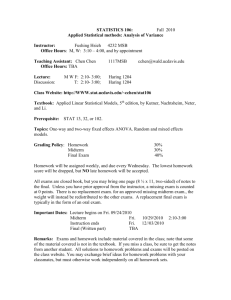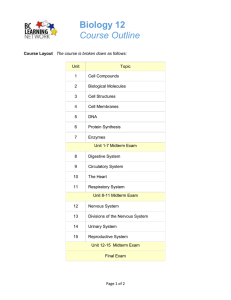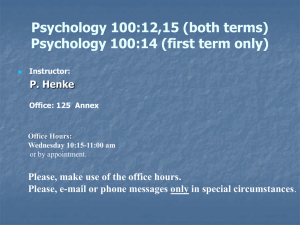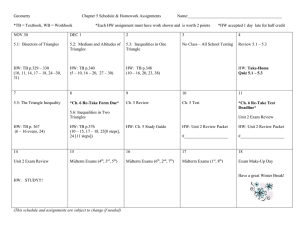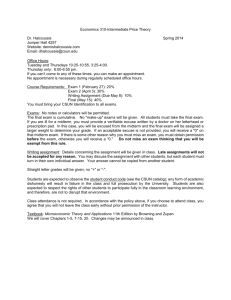ORF 245 – Fundamentals of Engineering Statistics
advertisement
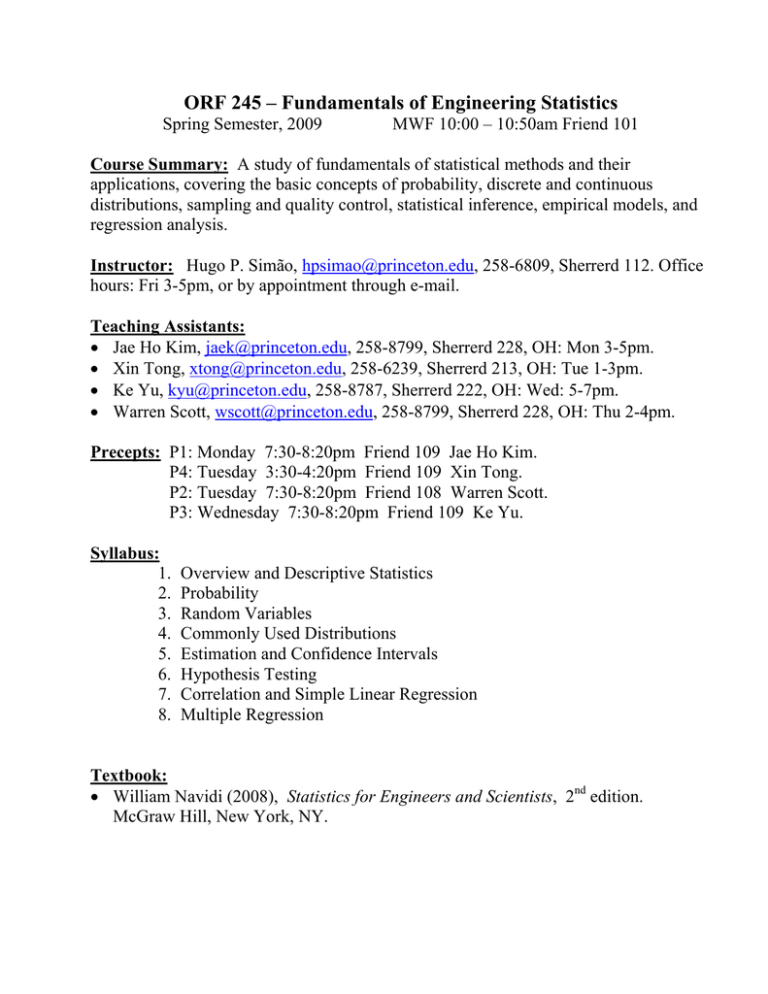
ORF 245 – Fundamentals of Engineering Statistics Spring Semester, 2009 MWF 10:00 – 10:50am Friend 101 Course Summary: A study of fundamentals of statistical methods and their applications, covering the basic concepts of probability, discrete and continuous distributions, sampling and quality control, statistical inference, empirical models, and regression analysis. Instructor: Hugo P. Simão, hpsimao@princeton.edu, 258-6809, Sherrerd 112. Office hours: Fri 3-5pm, or by appointment through e-mail. Teaching Assistants: • Jae Ho Kim, jaek@princeton.edu, 258-8799, Sherrerd 228, OH: Mon 3-5pm. • Xin Tong, xtong@princeton.edu, 258-6239, Sherrerd 213, OH: Tue 1-3pm. • Ke Yu, kyu@princeton.edu, 258-8787, Sherrerd 222, OH: Wed: 5-7pm. • Warren Scott, wscott@princeton.edu, 258-8799, Sherrerd 228, OH: Thu 2-4pm. Precepts: P1: Monday 7:30-8:20pm Friend 109 Jae Ho Kim. P4: Tuesday 3:30-4:20pm Friend 109 Xin Tong. P2: Tuesday 7:30-8:20pm Friend 108 Warren Scott. P3: Wednesday 7:30-8:20pm Friend 109 Ke Yu. Syllabus: 1. 2. 3. 4. 5. 6. 7. 8. Overview and Descriptive Statistics Probability Random Variables Commonly Used Distributions Estimation and Confidence Intervals Hypothesis Testing Correlation and Simple Linear Regression Multiple Regression Textbook: • William Navidi (2008), Statistics for Engineers and Scientists, 2nd edition. McGraw Hill, New York, NY. Computation: A pocket calculator with at least a memory and a square root key is required for homework, exams and classes. Some homework will require a statistical software package. R, S-Plus and Excel are examples of packages you may use. Attendance: Lecture attendance is required. The lectures focus and expand on key conceptual issues and statistical thinking, as well as highlight the points that will be tested in the midterm and final exams. Pop quizzes will aim at encouraging and rewarding class attendance. Always bring paper, pencil and a calculator to class. Homework: Problem sets will be posted on Blackboard one week before their due dates. They will be due on Thursdays, at 6:00pm. They should be placed in the “IN” box for ORF245 in the ORFE Undergraduate Lounge (Sherrerd 123). Please do not bring them to the morning lectures. No late homework will be accepted and a missed homework will receive a grade of zero. The lowest two scores will be dropped. All homework will be graded and each assignment will carry the same weight, except for the homework on the first week, which will have half the weight of the others. You are allowed to work with other students on the homework problems, but verbatim copying of homework is absolutely forbidden. Therefore each student must ultimately produce his or her own homework to be handed in for grading. You should also explain as much as possible of your reasoning when solving a problem. Avoid writing only the answers to the problems. Most of the homework will be assigned from the textbook, and some of the problems have the answers printed in the back of the book. Therefore, please explain your answers. You should certainly ask the instructor or the TAs for help with the homework problems, but only after you have earnestly attempted to solve them on your own. Any questions regarding homework grades should first be addressed to the TAs; if they cannot be satisfactorily resolved with the TA, then feel free to discuss them with the instructor. Exams: There will be two in-class midterm exams and a final exam. Missed exams will receive a grade of zero. Proven emergencies will be dealt with on a case by case basis. All exams are open-book and open-notes. Calculators may be used during the exams, but not computers. Schedules and Grading Policy: • Problem sets (25%) ……………….………………… 6:00pm of due dates • Quizzes (5%) ……………………………………………… Sporadic • Midterm Exam I (15%) …………….…………………....… Fri Mar 06 • Midterm Exam II (15%) …………………………………… Fri Apr 17 • Final Exam (40%) ……………………....…… Fri May 15 1:30-4:30pm Frick 120
